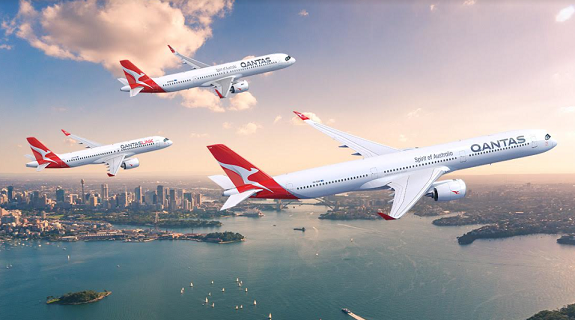 In a remarkable display of resilience and recovery, the Qantas Group, one of the world’s leading airlines, has announced its market update, revealing a solid performance that supports significant fleet investment and promises generous returns to shareholders. With an anticipated Underlying Profit Before Tax between $2,425 million and $2,475 million[1] for the fiscal year 2023, Qantas Group has firmly reestablished itself as a formidable force in the aviation industry.
In a remarkable display of resilience and recovery, the Qantas Group, one of the world’s leading airlines, has announced its market update, revealing a solid performance that supports significant fleet investment and promises generous returns to shareholders. With an anticipated Underlying Profit Before Tax between $2,425 million and $2,475 million[1] for the fiscal year 2023, Qantas Group has firmly reestablished itself as a formidable force in the aviation industry.
Bolstered by robust travel demand and the successful completion of its comprehensive three-year recovery program, the airline has experienced a notable surge in flying activity during the second half of the year, attributed to the arrival of new aircraft[2], the return of widebody jets from long-term storage, and substantial improvements in operational reliability.
Emphasizing its commitment to serving its domestic market, the Qantas Group is set to exceed pre-pandemic levels with a projected 104 per cent capacity by the end of the second half of 2023. This increase will be spearheaded by a significant flight surge on key routes connecting Melbourne, Sydney, and Brisbane[3]. Furthermore, the Group’s international capacity is expected to rebound to over 80 per cent of pre-COVID levels by the end of the same period, with a slightly adjusted rate of growth due to initial supply challenges, including a three-month delay in the Melbourne-Hong Kong route restart caused by a shortage of ground handlers at the overseas port.
Excitingly, Qantas has unveiled plans to ramp up its flying activities from October 2023 onwards, aiming to reach approximately 100 per cent of pre-COVID international capacity levels by March 2024, demonstrating the company’s confidence in the industry’s resurgence.
As anticipated, the gradual restoration of overall market capacity has resulted in fare levels normalizing from the earlier peaks in the first half of the fiscal year 2023. However, yields are expected to remain substantially higher than pre-pandemic levels throughout the fiscal year 2024, particularly on international routes. International freight yields have also moderated to levels approximately 1.5 times greater than pre-COVID levels.
Promisingly, forward booking trends indicate a sustained and robust travel demand well into the fiscal year 2024. Revenue intakes[4] have soared to 118 per cent of pre-COVID levels for Group Domestic and an impressive 123 per cent for Group International.
To enhance customer satisfaction, the Qantas Group has prioritized improvements in reliability and on-time performance, leading to an overall enhancement in the customer experience.
Aligned with the industry stabilization and the gradual dissipation of operational buffer costs, the spare capacity that was previously deployed to bolster reliability is now generating revenue. Although jet fuel prices remain elevated, recent downward price movements are expected to improve costs during the second half of 2023. This benefit will be partly offset by adverse foreign exchange rate fluctuations, ultimately providing an overall positive impact of $150 million. Furthermore, adverse bond rate movements are projected to have a non-cash impact-on provision of $40 million during the same period. Qantas Loyalty, the airline’s loyalty program, remains on track to achieve its ambitious FY23 Underlying EBIT target of $425 million to $450 million.
Marking a significant milestone, the Qantas Group has successfully concluded 38 enterprise agreements under its revised wage policy, encompassing approximately 80 per cent of its total workforce. These agreements entitle eligible employees to receive a $5,000 recovery boost, with an estimated 20,000 employees expected to be eligible for a recovery bonus of up to $6,500, linked to the current Qantas share price and vesting after the company’s full-year results in August 2023.
Capitalizing on its strong financial position and the positive market outlook, the Board has decided to augment the existing on-market buy-back program by an additional $100 million. Initially announced in February, the existing buy-back program of up to $500 million is now 78 per cent complete, with an average share price of $6.49.
The Qantas Group remains on track to achieve its revised capital expenditure target of $2,600 million to $2,700 million for the fiscal year 2023. This expenditure includes forward payments for aircraft scheduled for delivery in future years.
Considering the recent buy-back announcement, the Group anticipates that its net debt will range between $2,700 million and $2,900 million by June 30, 2023. This figure is significantly lower than the bottom limit of the revised target range of $3,700 million to $4,600 million.
Commenting on the Group’s outstanding performance, Qantas Group CEO Alan Joyce expressed his satisfaction: “We’re witnessing the expected broad trends as the industry rebounds, and trading conditions remain highly favorable. More segments of the aviation supply chain are returning to normal, enabling us to reintroduce spare aircraft and crew that were previously in reserve. This, combined with lower fuel prices, is exerting downward pressure on fares, which is great news for our customers.”
Joyce added, “We accounted for an additional $200 million in overheads for FY23 due to the operational buffer we had implemented, which can now gradually be rolled off. By the end of this half, five aircraft that were in reserve last Christmas will be back in operation. Although the industry continues to face capacity constraints and the travel sector remains strong, there is still an imbalance between supply and demand, which is expected to persist for the foreseeable future, particularly in international travel. We are poised to receive eight new aircraft before the end of this calendar year, and our teams are diligently working to restore the remaining stored aircraft through extensive maintenance, ensuring they are ready to take flight once again,” he concluded.
Written by: Anne Keam




















